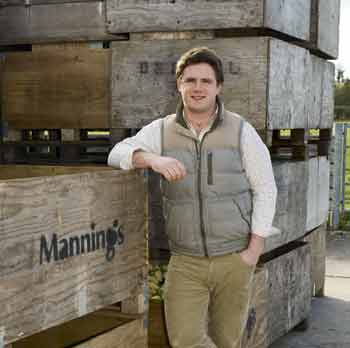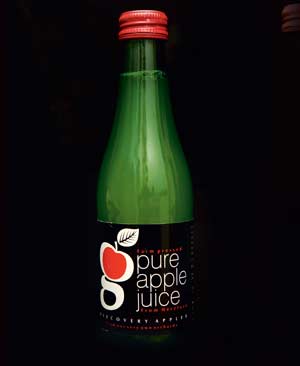University student runs a successful business

Juggling university life with business is no mean feat, but Rosie Cowper meets a man doing just that Try telling James Manning, a 21-year-old, third-year Agricultural Business Management student, to worry about the credit crunch. While many farmers tighten their belts in the face of the economic crisis, James is determined that Manning’s, his fledgling fruit-selling business, is going to flourish. Started in 2006, while James was in his first year at Reading University, Manning’s is a provider of quality apples and pears that he has set up in Herefordshire and runs alongside studying for his degree. Unlike most students, who would view the prospect of this sort of balancing act with mild horror, James didn’t see the point in waiting for graduation. “When I first had the idea, I could see so much potential in it that I thought it would be stupid to wait until the end of uni and try it then because I’d had a new leap of enthusiasm that I didn’t want to waste,” says James. “With the fruit market as competitive as it is, if you have an idea, you need to get moving as soon as you can.” Manning’s, which is set to have a £90,000 turnover in its first year, provides a varied range of Herefordshire apples and pears to its customers. A popular sideline product is James’s “G-juice”, an apple juice drink pressed locally using different varieties. James was brought up with his younger brother Rich and sister Tor on their father’s dairy farm in Herefordshire and has always been keenly involved in this business. But it was during a summer working at Breinton Manor farm shop and orchards owned by his uncle, Richard Wall, that James had the germ of his idea. “I spotted a gap for offering a bespoke service of delivering flexible quantities of quality Herefordshire fruit. If a company only wants one or two boxes, then that’s fine. As soon as I start pressuring them for larger quantities I’ll lose the sense of ease between myself and the customer, which is what I think makes them confident about buying from me.” After successfully setting up contracts with various farm shops and delis across eight counties and gaining experience of the market, it wasn’t long before bigger companies, such as the national garden centre chain Wyevale expressed interest in James’ produce. “It went from selling varieties of apples, to selling lots as a brand name,” he says. “I have given my apples an identity.” But James is resolute when it comes to keeping control over who he supplies. “The main issue with supplying supermarkets is control. As soon as I start losing that in terms of price, how I package the product and where I want to take it, I think I’ll fall short. So it seems that the best way to move the business forward in exactly the way I want to is to stay away from them.” James’ enthusiasm for allowing people to get to know about the quality of the fruit available from UK farms is infectious and doing taster sessions at different outlets has allowed people to meet him and taste his products. His affable personality and passion for his fruit helps inspire the interest of his customers. “I like to get people trying these different varieties because I think there is some confusion in this country with the consumer not knowing what English apples actually taste like.” Part of the appeal of James’ produce is because consumers can know where their food is coming from. The trend for locally-grown food has never been stronger and James stresses the benefits of English fruit over imported. “Herefordshire is known for great fruit, great food and great products; it’s such a diverse farming county. It’s all about people making the most of what’s around them and being confident and proud of what they can do with it.” The service offered by Manning’s means that often apples are picked in the morning and are on the shelves in shops the same afternoon. “If you’re going to provide a good product, then you need to provide a good service,” he comments. “If I can do both, then, hopefully, I’m on to something.” Running a business while studying has not been without potential problems. But David – who has been encouraged all the way by Mum and Dad, Liz and David – is enterprising enough to manage the workload. “There was a lot of thought that it would affect the quality of my university work,” James says. “But I do think I have a lot of free time at uni and as long as I manage that time effectively, I can get a hell of a lot done.” As well as coursework, rugby training and working closely with The Reading Agricultural Society, a typical day at uni for James comprises processing new orders, managing his team of family members and employees at home who deal with packing and delivering the product and attending lectures. “We have worked it so that everybody working for me knows when I’m in lectures, so they tend to leave me alone. If there’s an issue I sort it out as soon as lectures finish,” says James. “I think most people think I’m mad, they wonder how on earth I manage. But as long as I want to do both, I can.” A recent online survey by the National Federation of Young Farmers Clubs showed that young people are citing unreliability, bureaucracy and lack of financial reward as the key barriers to entering farming, but James’ attitude to these drawbacks is simple. “At the moment I’m running this fruit business and I fully intend to keep running it. But I also come from a dairy farming background and I’m keen to take that on and sell that product using my experience of marketing to sell the milk. If you want to do something, no matter how many obstacles there might be in your way, it’s important to take that challenge head on. “This year my challenge has been to make the business work alongside doing my degree. I think that in UK farming it’s so important for young people to have the confidence in their produce that they can take it, sell it and market its benefits. If you want a better price you’ve got to get out there and find it for yourself. If we sit back and let others do it for us, it’s not just going to come to us.” As well as completing his degree course, James feels the future for his business is bright, despite the credit crunch. “There will always be a demand for apples,” says James. “It’s a popular food, like milk and bread. “I think as a whole, the industry won’t be as affected as others. But if I have a few knockbacks, I’ll learn from them and have the support of my uncle, parents and friends.”
Gap in market

University student James Manning spotted a gap in the market.
 Challenge
Challenge
